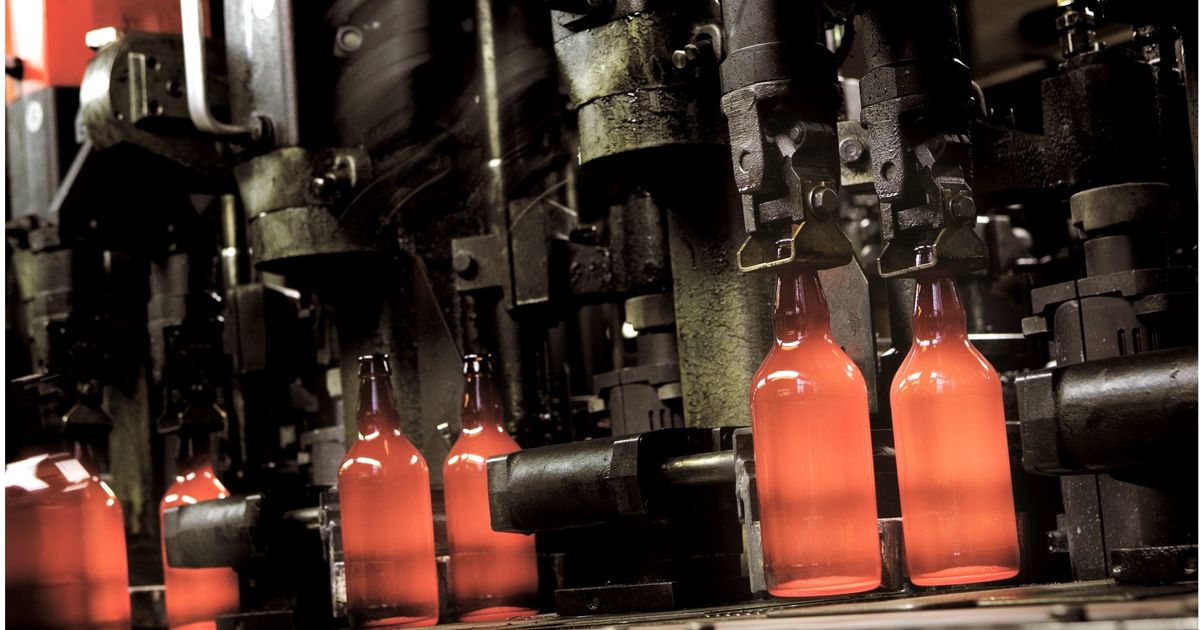
Published: 13th February 2025
Sustainability is the word on everybody’s lips at present. How can breweries adapt to ensure they’re operating in a sustainable way, reducing their carbon emissions and minimising waste?
The packaging material they choose for their beers is one important way in which breweries can bolster their sustainablity credentials. Glass has always been the most sustainable and environmentally friendly packaging material, and Yorkshire-based glass manufacturer Beatson Clark always goes the extra mile to minimise its environmental impact.
Easy to recycle
The sustainability of glass sets it apart from other packaging materials. Glass is 100% recyclable forever, and it can be melted down repeatedly to create new bottles without any loss of quality or integrity.
In the UK 74% of glass is currently recycled, and the industry is working towards a target of 90% by 2030.
Amber glass containers manufactured by Beatson Clark contain 56% post-consumer recycled material on average, while the figure for white flint is 36%. Any waste glass created during the manufacturing process is also recycled back into the furnace, so there is zero waste and even lower use of raw materials.
Every 10% of recycled glass means an estimated 5% reduction in CO₂ emissions and a 3% cut in energy consumption, so the more recycled glass manufacturers use, the better it is for the environment.
These efforts to recycle more and waste less are all part of Beatson Clark’s commitment to support the government in achieving Net Zero greenhouse emissions nationwide by 2050.
So important is recycled glass, or cullet, to the manufacturing process at Beatson Clark that the company has its own dedicated recycling plant on site which provides a steady flow of waste glass for the furnaces.
Every year Beatson Clark processes around 44,000 tonnes of waste glass recovered from kerbside collections, bottle banks and the hospitality trade on site. This glass is then processed and melted in the furnaces to make new bottles and jars, all on the same site in South Yorkshire.
This ‘closed loop’ recycling system ensures that large volumes of recycled glass are processed on site and used in the production of new containers, significantly reducing the environmental impact of the manufacturing process.
“Recycling waste glass is a really important part of our manufacturing process as it reduces the amount of raw materials we use and cuts down on energy use and carbon emissions too,” explained Charlotte Pike, Marketing Manager at Beatson Clark.
Charlotte added that Beatson Clark works hard to encourage householders to recycle more and to recycle correctly by identifying what glass can go in the recycling bin and what can’t.
Heatproof glass like Pyrex and oven doors can’t be recycled with bottles and jars, for example, and the same applies to mirrors, spectacles, window glass and light bulbs. They melt at a different temperature and can cause glass defects in the new packaging being produced.
Beatson Clark works closely with British Glass and FEVE, the European Glass Container Federation, to encourage people to recycle more glass and to keep as much recycled glass in the UK as possible – currently 335,000 tonnes of glass are exported from the UK to mainland Europe every year.
Reducing energy use and carbon emissions
Beatson Clark has also taken steps to ensure that energy use and carbon emissions are kept as low as possible during the manufacturing process. Its regenerative furnaces reuse waste heat, cutting the amount of energy needed to achieve the correct temperature by approximately 15% and reducing emissions, which are carefully controlled and monitored. The electrical boost in the amber furnace helps melt the batch more efficiently, reducing the fossil fuel used by approximately 10%. What’s more, Servo Electro Mechanisms in Beatson Clark’s IS machines reduce the compressed air consumption by over 10% and save energy too.
While these efforts are all working towards a carbon neutral manufacturing process, we are aware there is more that can be done. The industry is investing heavily in new technologies to replace the existing glass melting process. Along with British Glass, the industry is lobbying the government to move to more renewable energy sources such as hydrogen or sustainably generated electricity to power glass furnaces. Unfortunately, the infrastructure is not yet available in the UK to allow Beatson Clark to switch from gas to more sustainable energy sources. Once improved infrastructure is in place the company plans to switch its furnaces to more environmentally friendly fuels.
Beatson Clark’s commitment to sustainability, coupled with the inherent advantages of glass packaging, offers breweries an opportunity to align their brand with eco-friendly practices while providing consumers with a high-quality drinking experience.
Protective qualities of amber glass
One of the most significant advantages of amber glass is that it offers exceptional UV protection, blocking out harmful rays from sunlight. This can be crucial to protect the colour and flavour of beers, which can be affected by light strike.
Amber glass protects beer and other liquids from over 90% of harmful UV light, it helps to extend the shelf life of the beer, and it ensures that the taste and quality of the beer remains unchanged.
Glass is also the healthy packaging choice: it’s inert, so no chemicals can leach from the packaging into the product, and it’s the only mainstream packaging material that doesn’t require a protective layer inside.